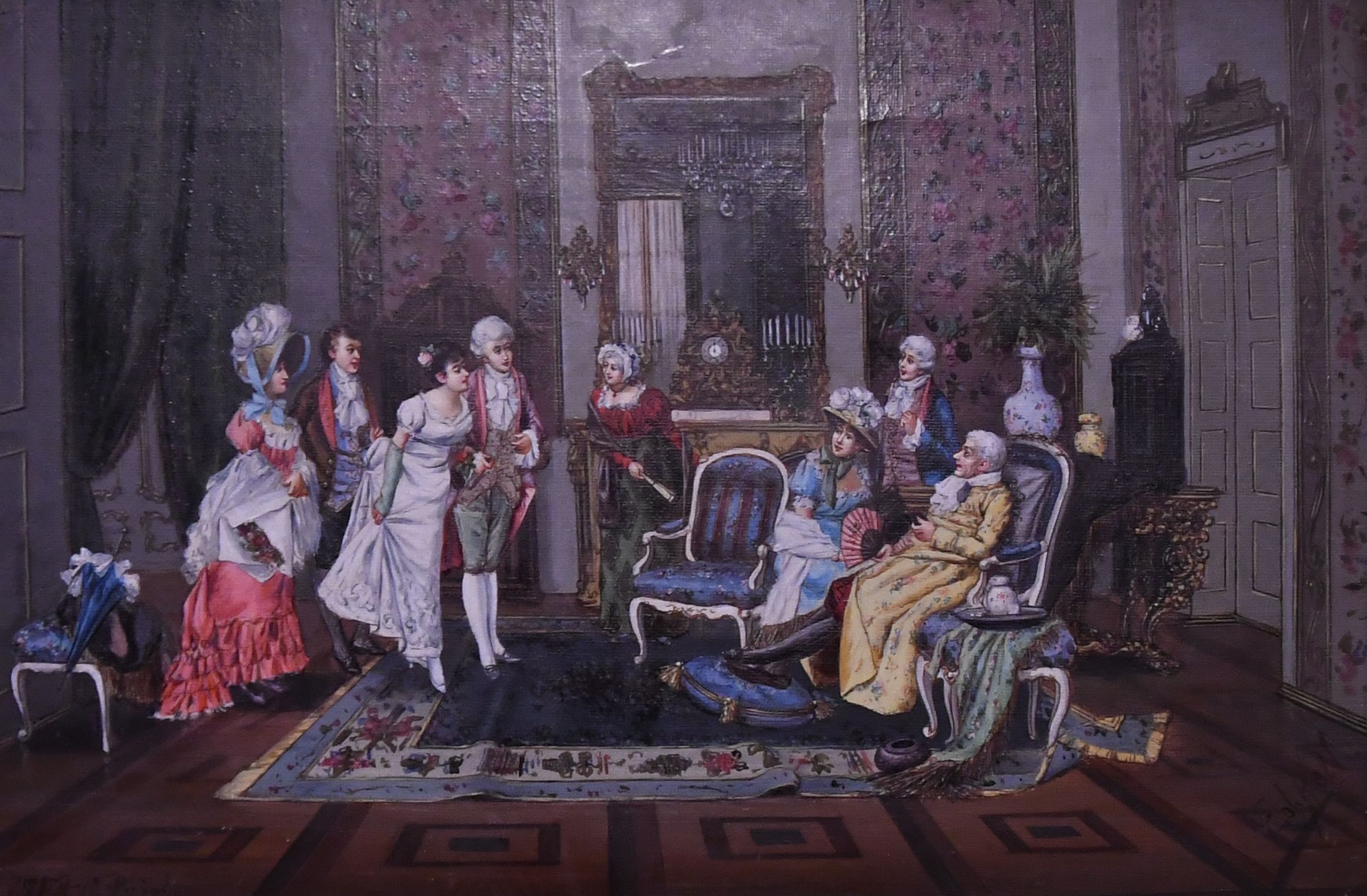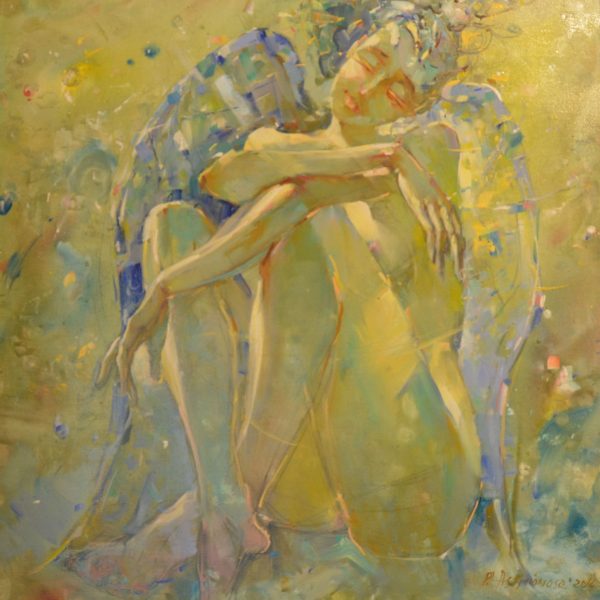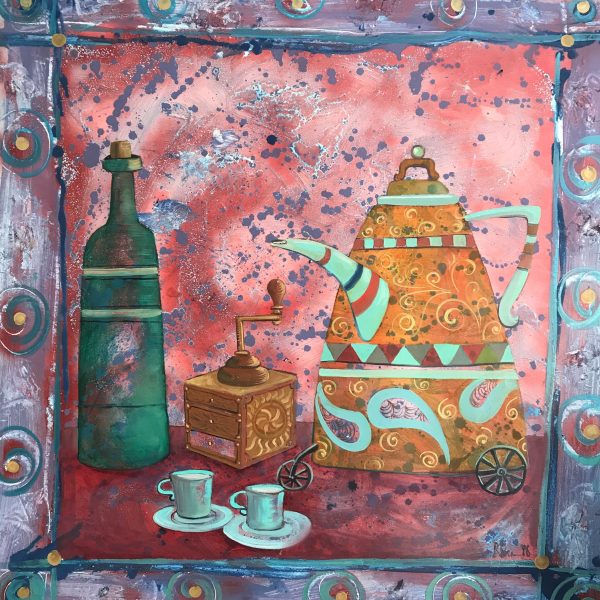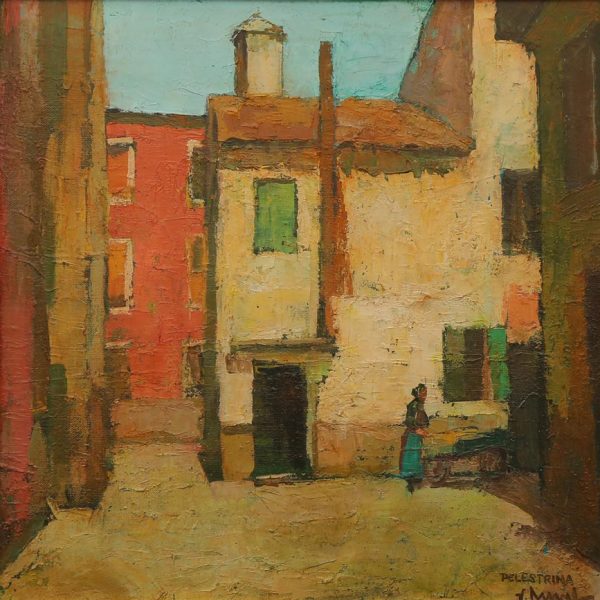Copie dupa Clemente Pujol de Gustavino, autor Eduard A. Keil (1862 – 1935) – „Serata”, sec. XIX
2.770,00 €
- Autor
- Dimensiuni
- Ţară de provenienţă
- Pret-orientativ
- Tehnica
- Tema
- Observatii
Clemente Pujol de Gustavino’s sumptuous painting exhibits the qualities for which nineteenth-century Orientalism is renowned. Its precision of line, richness of color, and narrative possibilities recall the works of Orientalism’s greatest masters, while the individual details of the composition are uniquely Pujol’s own. It is Pujol’s ability to combine the hallmarks of this genre with a distinctive and immediately recognizable style that make The presentation of silks one of his most satisfying works.
Though Pujol exhibited primarily in Austria and Germany, his Spanish heritage is evident in the architectural settings he chose for his Orientalist paintings. Rather than the Egyptian backdrops favored by Rudolf Ernst (1854-1932) and Ludwig Deutsch (1855-1935), two artists whose work Pujol knew and admired, Pujol delighted in the intricacies of Moorish design. The interior space depicted here may have been inspired by the architectural details of the Alhambra or the throne room of the 10th century palace of Madinat al-Zahra near Córdoba; the carved stucco on the wall flanking the scalloped arch, partially seen on the left hand side of the composition, is particularly close. (This vignette can be seen in others of Pujol’s works as well; Cf. The introduction). Like many Orientalist painters, however, Pujol strayed often from his source: the combination of architectural elements in this palace is a fantasy and Pujol’s transcription of Arabic script is flawed.
The explanation for this eclecticism might lie in Pujol’s practice. With ready access to lavish books of lithographs, photographs, museum collections, and even world fairs, Pujol had a wealth of information on Islamic architecture on which to base his art – the 1878 Exposition Universelle in Paris included elaborate recreations of both the Alhambra and some of Córdoba’s best known sites. The temptation to include elements from one or more of these indirect sources was felt by many European artists at the time, and despite their first-hand experiences in the Middle East, it became the trademark of Ernst and Deutsch.
The playfulness of the architecture in Pujol’s painting is evident elsewhere in his composition. The throne upon which the young woman sits looks suspiciously like a Maghrebi minbar and Oushak carpets are given a special artistic flair: floral spandrels are juxtaposed with a geometric border of stylized medallions, in highly unusual fashion. Pujol’s joy in the depiction of these historical textiles – and his seeming desire to invent styles all his own – influences his portrayal of figures as well. Five of the six men in this picture are swathed in splendid fabrics and garlanded with metallic embroideries. The gray-bearded man on the left, who shares in the presentation of a bejeweled red trunk to the lone woman in the scene, wears a fringed djellaba over his ornately hemmed robes. This hooded outer garment is typically seen in North Africa; the white gömlek, golden anteri, purple salvar, and embellished çipsip, or flat-heeled indoor slippers, of the seated woman are more typical of Ottoman Turkey. Given Pujol’s interests in both romantic narratives and the applied and decorative arts, the Lebanese silks the man offers seem a particularly appropriate gift. They not only suggest the importance of this dark-haired lady – she is the charmed recipient of luxury goods from a far off land – but they allow Pujol to demonstrate his talents as a painter of fine materials as well.
Standing in front of this dignified gift-bearer is a second bearded man, in even more elaborate attire. The shimmer of his kaftan and the colors of the well-tailored and intricately striped qumbaz he wears underneath are reflected in the layered wrappings of his turban. Both men are familiar figures in Pujol’s art, reappearing in various settings and even more highly wrought guises, which range in origin from Central and Eastern Asia to Egypt and Moorish Spain (Cf. Le visiteur honore; Le cadeau). The African sentry on the right, flintlock musket in hand, is also a recurring and telltale figure: he can be found in the numerous „guard pictures” of Pujol’s mentors, the Austrians Ernst and Deutsch.
Pujol’s tendency to carry certain objects, accessories, and even individuals from one composition to the next, and still create an original narrative around them, recalls the art of film-making. Like stills from a Technicolor movie, each of his Orientalist pictures seems to represent a meaningful moment in a larger, interconnected story. The woman in The presentation of silks is a regular character in this Orientalist drama: she stands humbly before our gray-bearded friend in The introduction; she is enthroned and showered with gifts in the present work; she walks alone through arched doorways in The messenger; she pleads her case before the Emir, in a painting by the same name. To understand the plight of Pujol’s protagonist, and the reason for her rise and fall, one must consult – and, Pujol must have hoped, purchase – each painstakingly detailed panel.
Pujol often painted his Orientalist scenes on wooden panels, which give his colors their rich and jewel-like glow. At least three other pictures in Pujol’s oeuvre were painted on panels of similar dimensions, suggesting that this was one of several preferred sizes for the artist. Though undated, the confidence with which Pujol executed his subject, and the excerpts from Ernst and Deutsch, suggest that this picture was painted after the mid-1870s.
We are grateful to Dr. Emily M. Weeks for writing the above note.
Categorie: PicturaProduse recomandate
Articole recente
- Galeria Alexandra’s la Courtyard by Marriott Bucharest Floreasca
- Parteneriat nou: Galeria Alexandra’s & Imperia Club
- Sakura, cel mai mare diamant roz, s-a vândut cu aproape 30 de milioane de dolari
- Paharul de Cultură, inițiativa culturală a cramei Villa Vinea
- Artă de Cinci Stele – Gabriela Cristea la Phoenicia Grand Hotel
Arhive
- octombrie 2021
- iunie 2021
- mai 2021
- martie 2021
- februarie 2021
- ianuarie 2021
- noiembrie 2020
- octombrie 2020
- iunie 2020
- martie 2020
- februarie 2020
- ianuarie 2020
- decembrie 2019
- noiembrie 2019
- octombrie 2019
- septembrie 2019
- mai 2019
- februarie 2019
- ianuarie 2019
- decembrie 2018
- noiembrie 2018
- octombrie 2018
- septembrie 2018
- august 2018
- iunie 2018
- mai 2018
- aprilie 2018
- martie 2018
- februarie 2018
- ianuarie 2018
- decembrie 2017
- noiembrie 2017
- octombrie 2017
- septembrie 2017
- august 2017
- iulie 2017
- iunie 2017
- mai 2017
- aprilie 2017
- februarie 2017
- ianuarie 2017
- octombrie 2016
- iunie 2016








Comentarii recente